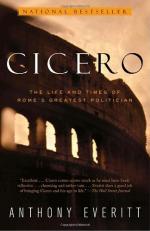
|
| Name: _________________________ | Period: ___________________ |
This test consists of 15 multiple choice questions and 5 short answer questions.
Multiple Choice Questions
1. What impressed Cicero about the potential of becoming an advocate in Chapter 2?
(a) The impact an advocate could have in the courtroom.
(b) The audience's reaction to an advocate.
(c) The money a public speaker could make.
(d) The fame and power of an effective public speaker on the world.
2. How many inhabitants did Rome have in the First Century, B.C.?
(a) Less than a million.
(b) Two million.
(c) Over a million.
(d) Over two million.
3. Which political problems were at the source of the crisis for the Roman Empire?
(a) An agricultural crisis and the economy.
(b) An agricultural crisis only.
(c) The economy and the changing role of the army.
(d) An agricultural crisis and the changing role of the army.
4. How long did Cicero live in Sicily in Chapter 4?
(a) Three years.
(b) Ten years.
(c) Five years.
(d) Eight years.
5. Which form of evidence did Cicero use to prove Catalina guilty?
(a) Letters.
(b) A confession.
(c) Witnesses.
(d) A previous case.
6. What did Everitt think about the Roman Constitution's checks and balances?
(a) There were the right amount.
(b) There were not enough.
(c) There were too many.
(d) It was not discussed in the book.
7. Which tactic did Caesar use in order to get a land reform bill passed?
(a) He appealed to the People.
(b) He bribed the Senate.
(c) He refused to attend meetings unless the bill was passed.
(d) He made several threats to the Senate.
8. What helped Rome to win the War of Allies?
(a) Granting citizenship to many of their Allies.
(b) Building additional weapons throughout the war.
(c) Unexpected reinforcements.
(d) Surprising military strategies.
9. Besides trying to convince the Senate to ratify his conquests, what was Pompey's goal after returning to Italy?
(a) Acquiring farms for veterans.
(b) Acquiring money for veterans.
(c) Stopping another war.
(d) Starting another war.
10. What nickname was Cicero given while studying certain subjects?
(a) The little Greek writer.
(b) The little author.
(c) The little rhetorician.
(d) The little Greek boy.
11. Which year was Cicero born?
(a) 110 B.C.
(b) 102 B.C.
(c) 106 B.C.
(d) 112 B.C.
12. According to Cicero in his speech to the Senators in Chapter 4, what did their reputation depend on?
(a) Their understanding of each crime.
(b) Their ability to deliver a fast decision.
(c) Their willingness to hear all the evidence.
(d) Their ability to convict Verres.
13. Which subjects did Cicero study extensively as a young man?
(a) Literature, rhetoric, and astronomy.
(b) Literature, philosophy, and rhetoric.
(c) Literature, astronomy, and philosophy.
(d) Literature, philosophy, astronomy, and rhetoric.
14. How did the number of cases that Cicero received change after his defense of Roscius?
(a) He was overloaded.
(b) He decided to take fewer cases.
(c) He was more selective.
(d) He decided to stop taking cases.
15. With the ability to exercise sovereign power, how many Praetors were there in the Roman government?
(a) Sixteen.
(b) Thirty two.
(c) Four.
(d) Eight.
Short Answer Questions
1. What was absent from Rome that caused further troubles in managing their holdings?
2. How many years before Cicero was born did the crisis that would lead to the end of the Roman Republic begin?
3. How much was known about Cicero's mother, Helvia?
4. Based on Cicero's letters around the time of his speech about Caesar in Chapter 7, what was clear about his mood?
5. How was the Roman Constitution developed?
|
This section contains 593 words (approx. 2 pages at 300 words per page) |

|




